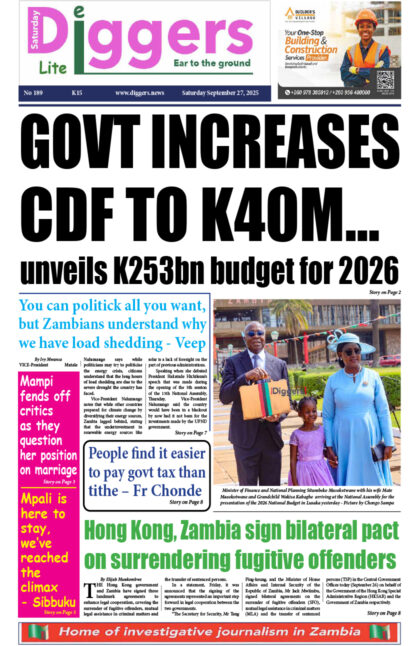THE Anti-Corruption Commission has asked the Lusaka Magistrates’ Court to find former president Edgar Lungu’s press aide Amos Chanda and two others with a case to answer in the use of insulting language case.
The commission has submitted that all the accused must be given an opportunity to present their story in defence.
In this matter, Chanda, his wife Mable and sister-in-law Ruth Mulenga are charged with three counts of using insulting language and obstructing Anti-Corruption Commission officers.
The three had earlier asked the court to acquit them, arguing that the State had not provided evidence to warrant the court to place them on their defence.
According to their submission on no case to answer filed in court, the trio argued that the state’s evidence did not prove the allegations they are charged with.
They further submitted that the officers were not stopped from doing their work and that no witnesses proved that the officers were insulted by the accused persons.
Meanwhile, the court is expected to make a ruling on whether the accused have a case or no case to answer on March 23.
But in its submission on case to answer, the state has submitted that the prosecution has established a prima facie case whereby essential elements of the case have been proved.
ACC submitted that the search at Chanda’s property was a legitimate search and that the accused had no reasonable cause to use insulting language on the officers in due execution of their duty.
The commission further submitted that the accused persons or their agents directly or indirectly had no right to cause obstruction to the officers in due execution of their duty.
“The anti-corruption commission officers had a legal duty to exercise following the duly signed warrant that was served on adults who were found at those premises. Any refusal or objection or indeed any assault or delay would suffice in constituting the offence of obstruction under section 63 of the A.C Act no. 3 of 2012,” ACC stated.
The commission submitted that all the accused must be given an opportunity to present their story in defence.
“From the defence submission, they have argued that the state witnesses acted unlawfully and were not telling the truth but lies. Your Honor, that assertion in itself cannot render the case to come to a halt before their side of the story is heard. They have argued that the prosecution witnesses lied. We submit that, by merely asserting that the witnesses lied is not an issue that a court of competent jurisdiction ought to consider at this stage. Like we argued earlier, truthfulness is a preserve of the court after all the evidence has been laid before it; according to the Shamwana case that can only be determined after the other party has been given an opportunity to give the side of their story. At this stage of trial, all that the Prosecution needs to demonstrate is whether it is probable that accused could have insulted and obstructed the officers considering the circumstances,” submitted the commission.
“It is not in dispute that the officers conducted a search, it is also not in dispute that they had warrants of search and that the three accused persons were present during the search. The defence have as a matter of fact not disputed or given any indication to rebut the prosecution evidence that the trio used insulting language and obstructed the officers, except to argue that the search was illegal and they did not identify themselves. This is one matter that can only be settled after the defence have been heard considering that the prosecutions produced duly signed warrants and that the warrants were served except one where Ms. Beka gave consent. There was evidence that they indeed identified themselves. From the face of it is plain clear that the all the accused must be given an opportunity to present their story in defence.”
























